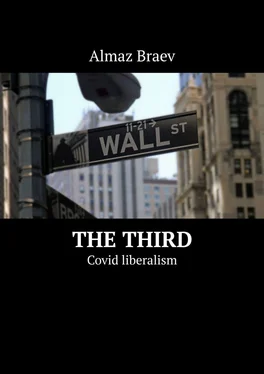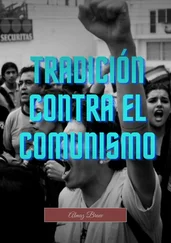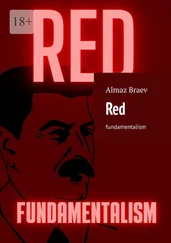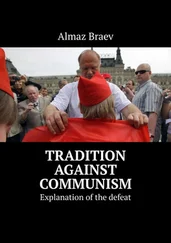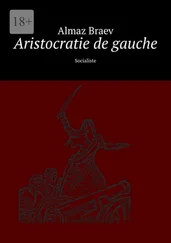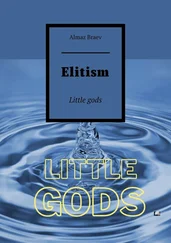Almaz Braev - The Third. Covid liberalism
Здесь есть возможность читать онлайн «Almaz Braev - The Third. Covid liberalism» — ознакомительный отрывок электронной книги совершенно бесплатно, а после прочтения отрывка купить полную версию. В некоторых случаях можно слушать аудио, скачать через торрент в формате fb2 и присутствует краткое содержание. ISBN: , Жанр: Политика, на английском языке. Описание произведения, (предисловие) а так же отзывы посетителей доступны на портале библиотеки ЛибКат.
- Название:The Third. Covid liberalism
- Автор:
- Жанр:
- Год:неизвестен
- ISBN:9785005102256
- Рейтинг книги:3 / 5. Голосов: 1
-
Избранное:Добавить в избранное
- Отзывы:
-
Ваша оценка:
- 60
- 1
- 2
- 3
- 4
- 5
The Third. Covid liberalism: краткое содержание, описание и аннотация
Предлагаем к чтению аннотацию, описание, краткое содержание или предисловие (зависит от того, что написал сам автор книги «The Third. Covid liberalism»). Если вы не нашли необходимую информацию о книге — напишите в комментариях, мы постараемся отыскать её.
The Third. Covid liberalism — читать онлайн ознакомительный отрывок
Ниже представлен текст книги, разбитый по страницам. Система сохранения места последней прочитанной страницы, позволяет с удобством читать онлайн бесплатно книгу «The Third. Covid liberalism», без необходимости каждый раз заново искать на чём Вы остановились. Поставьте закладку, и сможете в любой момент перейти на страницу, на которой закончили чтение.
Интервал:
Закладка:
Recessions affect people regardless of their social class. But it is manual and office workers, peasants, and the poor who take the brunt. Bourgeois classes are different. As we can see, and as has been portrayed to us in the past, the uncontrollable greed of the upper bourgeoisie caused the market to overheat (as far as goods, capital, and speculation go). That adversely affects the market and agents and then the state itself. Mass layoffs result in unemployment. Small profiteers stand as good a chance of going bankrupt as major factory owners. The state cannot help them (except maybe by giving out soup). Prices first soar such high public servants cannot afford to buy things they can’t do without and then plummet as the market begins to lure buyers. Still, the public servants are essentially broke.
Times like these see everyone pointing their finger at the prime minister, not the largest exchange speculator. The prime minister is the one to blame! He has failed to prevent speculation. Ordinary people blame the recession on the government and, by extension, the state. Land-poor peasants and tenant farmers go bankrupt; they have to flock to cities, either because they don’t earn enough to pay the rent or because no one buys their produce. These Zerefs, heirs of tradition, join the army of unemployed urban Zeremids. The Zeremids know for certain the blame lies with the state. But the rural Zerefs go even further in searching for an answer to the question, “Who hung the government out to dry?” Those on your side could have never done such a thing. Only an enemy could. An enemy of the people and of the state.
To Zerefs, all the harm comes from the enemy of the people, of the ethnos; to Zeremids, the prime minister is the enemy. Doctors and teachers, however, have no enemies. With that said, they might have some enemy. After all, Remids are former Zeremids and Zerefs. They, too, may know what office the enemy holds and what ethnic group they belong to. But Remids are statists. They are the ones who weigh the public on their shoulders. That’s why they agree that public officials are to blame, but they don’t think the state shares that blame. The state is sacrosanct. The state – the land of the fathers, Alemania, Fatherland – is paramount.
Remids’ self-reflection is highly developed. They may disown the specific. But they save the state and declare it innocent. The confluence of the low notes coming from Zerefs and the high tones from middle-class clusters brings German statism to life in the form of Nazism. Silent appeals are then heard by Zeremid leaders – who also come as a rule from provincial regions and families of the rural intelligentsia – and the leaders turn those appeals into a choir, a cacophony of yelling throats.
German Nazism resulted from a combination of Zerefs’ grievances and Zeremids’ complexes on the one hand and the romantic haze of the German state (brought about by Remids) on the other. German doctors, teachers, and public officials were saving their state while Zerefs and Zeremids were inflating the enemy’s guilt. Each reflection group contributed to German Nazism. The concentration of the middle layer or the high urbanization rate blocked another way to outclass struggle. Tradition led the people, though they were unaware of it.
Everyone, not only Germans, wants to start a family, which requires taking your status up a notch. Some societies and peoples consider it to be the wellbeing of their families and ethnos; others, as the prosperity of their state. Thanks to Remids, the state can guarantee prosperity for the people and the ethnos, even though the initial groups of tradition (and reflection) do not concur.
In Russia, the middle class was insignificant. During a crisis, armed workers and sailors (peasants disguised) entered into a fateful dialogue not with doctors and teachers but with the nobility. Did they have no one to tell about the Russian state? And about what state, one of the tsars and the priests? The discussion revolved around the public, not the state. There was no state anymore. It had all been self-deception.
CHAPTER X
ARE THERE LEVELS TO TOTALITARIANISM
How many industrial generations was Germany ahead of Russia?
From the so-called average, we can infer the population’s self-reflection level. Which level was it – Zeref, Zeremid, or Remid?
The Remid level, as we have found out, gives the informal elite of civilization a chance to stay alive.
After all, Germany still was a country of tradition, something that all nations feels like a phantom pining for the past. This manifested itself most clearly in Italian fascism. But the Italian fascists didn’t annihilate the local socialists until 1920. Russia was close in all ways to agrarian Italy. For that reason, in 1919—1920, the Italian socialists seized factories in the industrially developed central and northern Italy, following the example of Russia’s proletariat. Italy was a country of active anarchism, meaning it didn’t need the state.
With that said, Italians had spent 300 years fighting to free their homeland and unify it into a single state. The state meant ownership, the state scale, and that there are Remids. Italy’s statism took the form of fascism. In two years, all socialists, advocates of a socialist community, were killed off (with some help from the residents). That left the upper bourgeoisie, factory owners, and latifundistas pleased. The local administration sided with the fascists. In Russia, the proletariat and the peasantry followed Lenin, not Savinkov. Italy followed the former socialist Mussolini precisely because of the Risorgimento. The Italians wanted to order: they had suffered for centuries because of the lack of a single state.
The Witch-Hunt
Someone must be called to account for epidemics, disasters, crop failures: the practice of declaring the innocent guilty has existed since ancient times. In the Middle Ages, the Inquisition hunted down witches. This kind of hunting – searching for scapegoats – is something typical of all times.
The Inquisition chose not to reinvent the wheel. Catholic priests could not have a family. So, what reason was there for the Inquisition to love women, even the most beautiful of them? After all, when some kind of misfortune happened in a village or even across a whole city, it was all because some woman had evoked evil spirits. In female witchcraft, the dark people saw the cause of their troubles. This is the Zeref level. It doesn’t rely on facts or needs evidence. The Zeref level is one of the conjectures and black thoughts of loathing and envy.
The Zeremid level is one of wider practice. This kind of hunting involves someone specific and even logical, going from the specific to the general. Even though the specific here borrows a lot from the subconscious. But the Zeremids name the perpetrator’s name. They even have the temerity to call the ruler the culprit, even though they do so at the instigation of liberal Refags and, often, other revolutionaries. The thing is that traditional practice has several idols – ideals it lives with as people grow old and die. When saints’ names are secularized, people, it seems, no longer have a reason to live. But if people – soldiers, for example – don’t want to die for their king or fatherland – this level is that of Zeremids. Zeremids have primitive designs. They invariably want to stay alive. That was precisely why the Bolsheviks blamed their troubles on soldiers going to their deaths and on the tsar and his henchmen. The tsar wasn’t a witch – he was the people’s saint, God’s Anointed.
But they laid the blame on him all the same. This qualifies as the Zeremid level, with the entire ethnos declared guilty. This fits right in the middle of the dark tribal subconscious, which looks for the enemy without, as in primitive times, while the enemy is actually within. Is this cunning? Yes, it is cunning. Antisemitism can attain a Remid scale. But it is second-generation Zeremids and Remids that bring it to that level.
Читать дальшеИнтервал:
Закладка:
Похожие книги на «The Third. Covid liberalism»
Представляем Вашему вниманию похожие книги на «The Third. Covid liberalism» списком для выбора. Мы отобрали схожую по названию и смыслу литературу в надежде предоставить читателям больше вариантов отыскать новые, интересные, ещё непрочитанные произведения.
Обсуждение, отзывы о книге «The Third. Covid liberalism» и просто собственные мнения читателей. Оставьте ваши комментарии, напишите, что Вы думаете о произведении, его смысле или главных героях. Укажите что конкретно понравилось, а что нет, и почему Вы так считаете.
